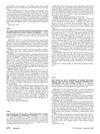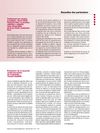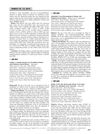 March 1999 in “Journal of The European Academy of Dermatology and Venereology”
March 1999 in “Journal of The European Academy of Dermatology and Venereology” Baldness may indicate higher heart disease risk in men.
 31 citations,
January 2017 in “Phytotherapy Research”
31 citations,
January 2017 in “Phytotherapy Research” Ziziphus jujuba Mills may have health benefits, but more research is needed to confirm its safety and effectiveness.
 2 citations,
September 2008 in “Fertility and Sterility”
2 citations,
September 2008 in “Fertility and Sterility” Adult offspring of sperm donation generally feel positive about their conception and view the donor as their biological father.
 December 2010 in “Médecine des Maladies Métaboliques”
December 2010 in “Médecine des Maladies Métaboliques” The Accu-Chek FlexLink Plus and Accu-Chek LinkAssist Plus make insulin pump use safer, simpler, and more comfortable.
 June 2016 in “American Journal of Cardiology”
June 2016 in “American Journal of Cardiology” Endovascular repair and open surgery for abdominal aortic aneurysms both result in a temporary decline in physical health, with no significant mental health difference, and a return to near normal health in 90 days.
 May 2024 in “Indian Journal of Dermatology”
May 2024 in “Indian Journal of Dermatology” Androgenetic alopecia in men is genetic and linked to health issues like obesity and heart disease, with treatments including minoxidil, finasteride, and hair transplants.
 April 2022 in “Indian Journal of Forensic Medicine & Toxicology”
April 2022 in “Indian Journal of Forensic Medicine & Toxicology” PSA can help diagnose high androgen levels in women.
 8 citations,
March 2012 in “The Journal of Steroid Biochemistry and Molecular Biology”
8 citations,
March 2012 in “The Journal of Steroid Biochemistry and Molecular Biology” Testosterone and dihydrotestosterone have similar effects on body composition and metabolic health in men.
 18 citations,
July 2019 in “Clinical Endocrinology”
18 citations,
July 2019 in “Clinical Endocrinology” Women with PCOS in Sicily show different levels of metabolic problems depending on their PCOS type, with obesity and abnormal lipid profiles being common.
 July 2022 in “International Journal of Health Sciences (IJHS) (En línea)”
July 2022 in “International Journal of Health Sciences (IJHS) (En línea)” Men with Type 2 Diabetes have lower DHT levels, which may affect fertility and lipid profiles.
 5 citations,
February 1996 in “Clinical pharmacology and therapeutics/Clinical pharmacology & therapeutics”
5 citations,
February 1996 in “Clinical pharmacology and therapeutics/Clinical pharmacology & therapeutics” Minoxidil given intravenously caused small changes in diastolic blood pressure and increased heart rate at higher concentrations in patients with high blood pressure.
 December 2016 in “Springer eBooks”
December 2016 in “Springer eBooks” Chrousos Syndrome is caused by mutations that make the body less sensitive to glucocorticoids, leading to various symptoms and requiring high-dose treatment.
 5 citations,
February 2020 in “European Food Research and Technology”
5 citations,
February 2020 in “European Food Research and Technology” African baobab fruit is a good source of antioxidants and micronutrients, but too much can cause laxative effects.
 14 citations,
July 2016 in “Fertility and Sterility”
14 citations,
July 2016 in “Fertility and Sterility” Changing the diagnosis criteria for PCOS might miss women at risk for related health issues.
 53 citations,
January 2011 in “Diabetes”
53 citations,
January 2011 in “Diabetes” People with PCNT mutations often develop severe insulin resistance and early-onset diabetes during childhood or adolescence.
 166 citations,
March 2007 in “Hypertension”
166 citations,
March 2007 in “Hypertension” High androgen levels in young women with PCOS are linked to higher blood pressure.
 June 2022 in “International journal of research and review”
June 2022 in “International journal of research and review” The article concludes that early diagnosis and lifestyle changes can prevent complications from high uric acid levels.
 14 citations,
January 2018 in “Endocrinology and Metabolism”
14 citations,
January 2018 in “Endocrinology and Metabolism” Many infertile women with PCOS in Central Vietnam have metabolic or insulin resistance syndrome, with obesity and older age increasing the risk.
 8 citations,
November 2012 in “Journal of Endocrinological Investigation”
8 citations,
November 2012 in “Journal of Endocrinological Investigation” Greek women with classic PCOS are more likely to have metabolic syndrome and insulin resistance than those with newer PCOS types.
 January 2024 in “American journal of clinical dermatology”
January 2024 in “American journal of clinical dermatology” Ritlecitinib is safe and well-tolerated for treating alopecia areata in patients aged 12 and older.
 9 citations,
March 2022 in “Antioxidants”
9 citations,
March 2022 in “Antioxidants” Synthetic antioxidants are effective, cheap, and stable, with some like zinc and cholecalciferol reducing child and cancer deaths, but the safety of additives like BHA, BHT, TBHQ, and PEG needs more research.
 10 citations,
August 2012 in “Clinical Pharmacokinectics”
10 citations,
August 2012 in “Clinical Pharmacokinectics” Type 2 diabetes does not change how metformin works in obese pregnant women, so dosage adjustments are not needed.
 1 citations,
July 2023 in “Frontiers in Immunology”
1 citations,
July 2023 in “Frontiers in Immunology” Oxidative stress and immune dysfunction are linked to both Hashimoto's thyroiditis and polycystic ovary syndrome, with diet and specific treatments important for managing these conditions.

Vitamin D is crucial for skin health and managing skin diseases.
 April 2018 in “Expert Opinion on Drug Safety”
April 2018 in “Expert Opinion on Drug Safety” Dutasteride is a safe and effective treatment for hair loss.
 August 2023 in “International Journal of Molecular Sciences”
August 2023 in “International Journal of Molecular Sciences” Liposomes show promise for delivering CRISPR for gene editing but face challenges like delivery efficiency and safety concerns.
 9 citations,
March 2022 in “Journal of the Endocrine Society”
9 citations,
March 2022 in “Journal of the Endocrine Society” Girls with PCOS have higher levels of certain androgens, which are linked to excess hair growth, but these androgens don't help diagnose PCOS.
 5 citations,
May 2023 in “Frontiers in immunology”
5 citations,
May 2023 in “Frontiers in immunology” Environmental factors like diet and vitamin levels, especially Vitamin D, can affect autoimmune diseases differently, with lifestyle changes potentially improving outcomes.
 16 citations,
February 2016 in “Gynecological Endocrinology”
16 citations,
February 2016 in “Gynecological Endocrinology” Indian women with PCOS from Delhi and Srinagar show different symptoms, with Delhi women having higher obesity and blood sugar issues, and Srinagar women showing more hair growth and testosterone levels.
 13 citations,
March 2016 in “Progress in Transplantation”
13 citations,
March 2016 in “Progress in Transplantation” Healthcare providers need better understanding and cultural sensitivity to improve care for transgender patients with kidney failure needing transplants.






























